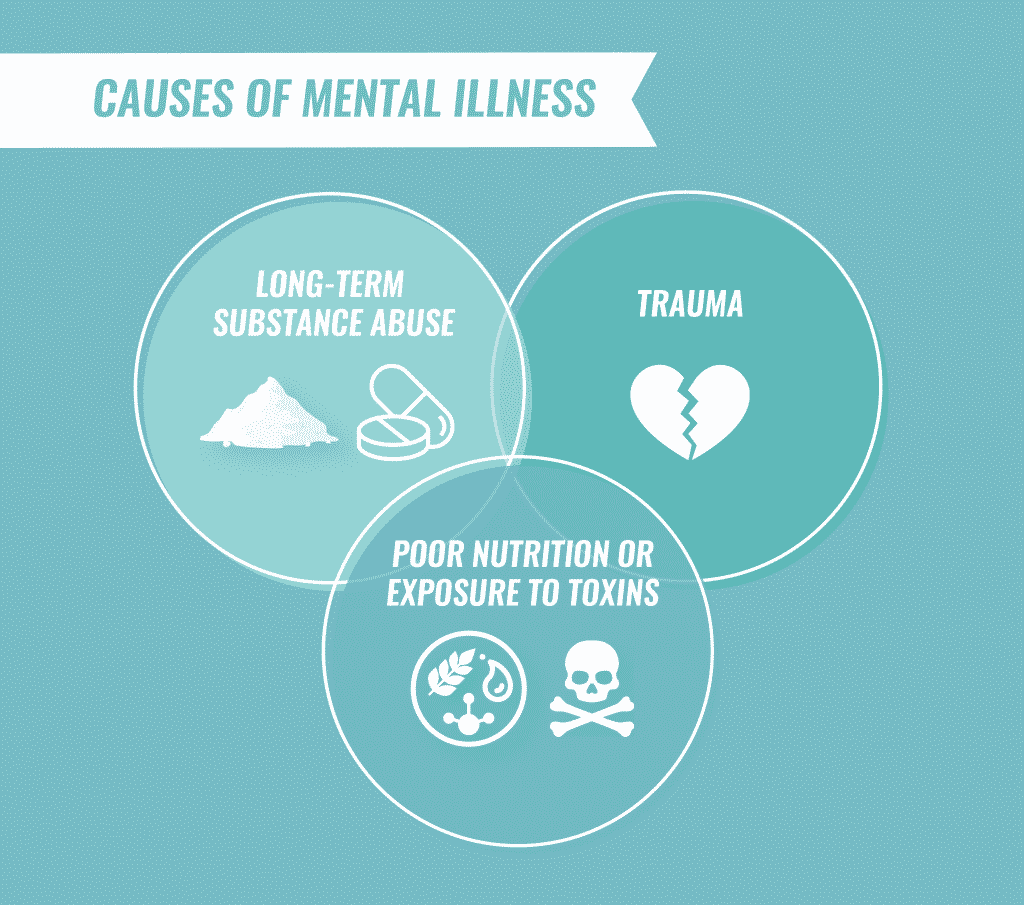Bad mental health can stem from many factors. It’s often a mix of physical, emotional, and social issues.
Understanding these causes is key to improving mental well-being. Mental health issues affect millions worldwide. Stress from work, family conflicts, and financial troubles can all contribute. Genetics and brain chemistry also play a role. Social isolation or trauma can worsen the situation.
Recognizing these factors helps in addressing and managing mental health better. It’s crucial to be aware of these causes to seek appropriate help. Let’s explore what leads to bad mental health and how to tackle it effectively.

Credit: thebetterindia.com
Topic of Contents
ToggleGenetic Factors
Genetic factors play a significant role in bad mental health. Family history of mental disorders can increase the risk. Certain genes may affect brain chemistry and mood regulation.
Family History
Bad mental health can run in families. If your parents had mental health issues, you might have them too. Family history plays a big role. Genes passed down from parents can affect your mind. These genes can make you more likely to have problems. Some families share more than just looks and habits. They share mental health issues too.
Inherited Traits
Some traits are inherited from parents. Traits like mood swings or anxiety can be passed down. Your genes decide many things about you. They can also impact your mental health. If a parent has a mental health issue, you might get it too. It’s all in the genes.
Environmental Influences
Early traumatic experiences can deeply affect mental health. Abuse or neglect during childhood can lead to anxiety and depression. A child’s brain is still growing, and trauma can disrupt this growth. Trust issues and fear may develop. Safe environments are crucial for mental health.
Living with constant stress wears down the mind. Daily pressures from work, school, or home can build up. Stress hormones stay high, leading to tiredness and irritability. Coping mechanisms are needed to manage stress. Exercise, rest, and hobbies can help reduce stress. Long-term stress can turn into serious mental health issues.
Lifestyle Choices
Substance abuse can harm mental health. Drugs and alcohol change the brain. These changes can lead to anxiety and depression. Using substances often makes problems worse. It can make it hard to think clearly. Relationships may suffer too. Friends and family might feel hurt or worried. This can add to stress. Seeking help is important.
Poor diet affects the mind. Eating too much junk food is harmful. The brain needs good nutrition to work well. Lack of vitamins and minerals can cause mood swings. Sugar highs and lows can lead to irritability. Not eating enough can cause fatigue and sadness. Healthy foods improve mood. Fruits, vegetables, and whole grains are good choices. Drinking water is also very important.
Social Isolation
Having friends and family is important. Support matters a lot. Without it, people can feel sad, lonely, and unloved, which can harm mental health. Friends and family make us feel good by giving love, care, and a listening ear. They bring happiness and help us in many ways. Without support, life feels harder and lonelier.
Loneliness is a big problem. It hurts mental health. Being alone too much is bad. People need others. They need to talk and laugh. They need to feel close to someone. Loneliness makes people feel sad and empty. They may feel like no one cares. This can lead to depression. It can make people feel very bad. Everyone needs friends. Everyone needs to feel loved.
Work-related Stress
High-pressure jobs can cause a lot of stress. Workers have to meet deadlines. They may work long hours without breaks. This can lead to burnout. People feel tired and irritable. They may have trouble sleeping. They also may not eat well. These jobs make it hard to have a work-life balance.
Worrying about losing a job is stressful. People with job insecurity feel anxious. They fear future layoffs. This can make them nervous every day. They may struggle with confidence. It affects their mood and self-esteem. Their mental health suffers.

Credit: ncdalliance.org
Physical Health Issues
Chronic illness can deeply affect mental health. Conditions like diabetes and heart disease bring stress. This stress can lead to anxiety and depression. Constant pain or discomfort adds to the problem. Feeling tired and weak is common. Daily activities become hard. This can make people feel helpless. Support from family and friends is crucial. Regular check-ups help manage these issues.
Sleep disorders impact mental health. Not sleeping well makes people irritable. It can make it hard to focus. Feeling tired all day is normal. This can lead to anxiety and depression. Sleep apnea and insomnia are common problems. Good sleep is important for a healthy mind. Healthy sleep habits can help. Going to bed at the same time each night is a good start. Avoiding caffeine before bed can also help.
Negative Thought Patterns
Self-criticism means being very hard on yourself. It is like having a mean voice in your head. This voice says you are not good enough. It says you always make mistakes. Over time, this can make you feel very sad or stressed. Feeling bad about yourself can hurt your mental health.
Catastrophizing means thinking the worst will happen. It is like seeing small problems as huge disasters. For example, if you fail a test, you might think you will never do well in school. This makes you worry a lot. It can stop you from feeling happy. It is important to see problems as they really are.
Traumatic Experiences
Traumatic experiences can lead to bad mental health. Events like abuse, accidents, or disasters deeply affect the mind. Such experiences often result in anxiety, depression, and other mental health issues.
Abuse
Abuse can deeply hurt the mind. It leaves lasting scars. Physical abuse breaks the body. Emotional abuse breaks the spirit. This pain causes bad mental health. Many struggle to trust others again. Every moment feels heavy. Fear and sadness can become normal. Healing from abuse takes time. It often needs support from others. Therapy helps many people. It can guide them to a safer place.
Accidents
Accidents can be shocking. They happen suddenly. The mind may replay the event. This can cause fear and worry. Injuries also cause stress. Recovery can be hard and long. Some can’t forget the accident. They may avoid similar places. This limits their life. Support helps in healing. Talking about the accident can ease the mind. Professional help can make a difference.

Credit: www.biocorplifesciences.com
Frequently Asked Questions
What Are The Common Causes Of Bad Mental Health?
Stress, lack of sleep, and trauma. These are common triggers.
Can Poor Diet Affect Mental Health?
Yes, unhealthy food can lead to mood swings. Good nutrition supports mental well-being.
How Does Social Media Impact Mental Health?
Excessive use can cause anxiety and depression. Balance is key.
Does Lack Of Exercise Contribute To Mental Health Issues?
Yes, physical activity boosts mood. Lack of it can lead to depression.
Can Genetics Play A Role In Mental Health Problems?
Yes, family history can affect mental health. Genetics matter.
Conclusion
Bad mental health stems from various factors. Stress, trauma, and genetics play roles. Lifestyle choices also impact mental well-being. Social isolation and lack of support worsen the situation. Recognizing these causes helps in seeking proper help. Everyone deserves good mental health.
Prioritize self-care and seek professional advice if needed. Small changes can make a big difference. Take steps to protect your mental health today.







